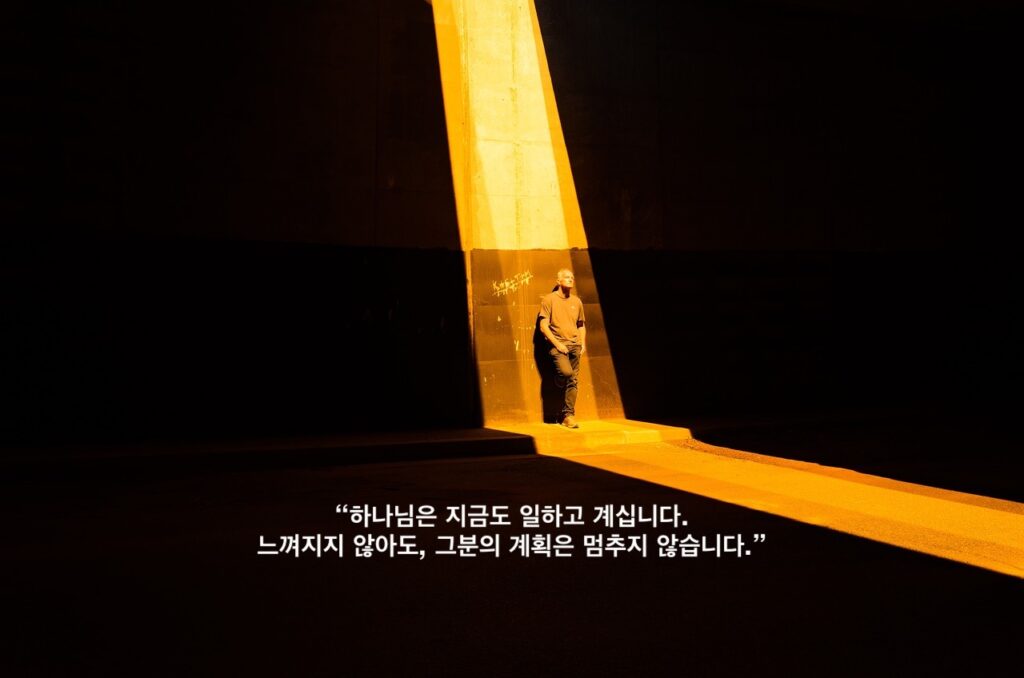At the Threshold of Grace for the Unworthy
“Can I truly stand before God again?”
This question provokes one of the deepest internal conflicts in the life of a believer. Especially when sin is repeated and begins to shake not just the conscience but the very root of faith, the believer experiences a kind of inner division, as if two personas coexist. A heart that repents coexists with a heart too afraid to stand before God. These two sides exist together but deny each other. Some are crushed under this contradiction and eventually give up their faith; others gradually distance themselves from God through self-condemnation. They know they must return in repentance, yet the faith and courage required to take that step feel like a closed door.
Many regard repentance as a simple act of decision, but in reality, it is an active and intense spiritual act. It is not merely emotional outpouring through tears but a deliberate turning away from the power of sin and a choice to face God again—one that includes decisive follow-through. Ironically, the greatest obstacle at that first step is guilt. While recognizing sin is a sign of spiritual health, prolonged guilt can trap the believer and block the path to repentance. Scripture is clear: “Therefore, there is now no condemnation for those who are in Christ Jesus” (Romans 8:1). This is both a declaration that there is no condemnation for the one who repents and an invitation for the one who recognizes sin to draw near to God.
The problem is that many believers believe this truth intellectually, but fail to accept it in their emotions and daily life. Their inner voices cry out: “I’ve gone too far,” “God won’t look at someone like me,” “Someone like me, who keeps sinning, doesn’t even deserve to repent.” These sound humble on the surface, but they stem from a fundamental misunderstanding of the Gospel. Repentance is not offered by those who are qualified, but by those who acknowledge they are not. And it is to these unqualified that God first extends His hand.
The lives of biblical figures testify to this truth. Peter denied Jesus three times and ran out weeping. His guilt must have felt too heavy to ever face the Lord again. Yet the risen Christ sought him out and simply asked, “Do you love me?” The measure of repentance is not the weight of sin, but the restoration of love. God values the decision to rise again and walk in His will more than a list of transgressions.
David also deeply understood the weight of sin. His adultery and murder were deserving of death under the law. Yet he turned to God in repentance. “My sin is always before me” (Psalm 51:3) was not self-pity, but a cry of one who acknowledged his whole being was marked by sin before God. He cast himself on God’s mercy: “The sacrifices of God are a broken spirit” (Psalm 51:17). God does not seek moral perfection, but those who humbly acknowledge their brokenness and plead for mercy. That is the essence of repentance.
Our inability to approach God in repentance is not due to a lack of mercy, but because our pride refuses to receive it. Guilt can appear spiritual, even noble, but it often masks a self-centered emotional state that is more accustomed to self-blame than God’s forgiveness. In truth, some regard their own disappointment more highly than God’s compassion. This may look like humility, but it is a denial of the power of the Gospel. God wants us free from guilt that claims to be bigger than His grace—because that guilt does not come from Him but from the enemy.
Satan tempts with sin, then condemns with it. Not to bring about repentance, but to cut off even the possibility of it. He dredges up our past, magnifies our failures, and makes us question God’s love. Even when we profess faith, he whispers, “You’ll fail again.” If we keep listening, we’ll be drawn away—not by God, but by the voice of condemnation, and we isolate ourselves from Him. Though often subconscious, the result is clear: we no longer approach God. That is guilt’s final goal.
God hates sin, but never gives up on the sinner. The Gospel bridges that gap. The cross is not a blank check to ignore sin, but the place where the penalty was truly paid. God didn’t just say, “It’s okay.” He said, “I have paid the price.” Those who believe this can cross the threshold of repentance—not by justifying sin or drowning in guilt, but by clinging to grace and moving forward.
The longer guilt lasts, the more we tend toward self-pity. But repentance is not pity—it is a decision. A broken spirit is not one lost in self-condemnation but humbled before God. Repentance is not self-denial but a full turning toward God. Guilt clings to the past; repentance prepares for the future. We are not meant to run from sin, but to turn from it—and toward Him. That is the walk of those who trust the power of the Gospel.
**Holding on to Grace in Repeated Failure**
Believers who barely cross the threshold of repentance often face the reality that change is slower than expected. After turning from major sin, life feels like it should transform instantly—but the same temptations and weaknesses remain. The moments of victory are short, the failures frequent. As failure repeats, even the grace once received begins to feel invalid. The believer starts to think, “I’m repeating the same sin. God must be done with me.” But God does not reject our repentance based on repeated failure. He warns only when our hearts are no longer sincere. The truth of repentance lies not in being sinless, but in seeking Him again and again, even when we fall.
Scripture does not ignore repeated sin. Paul himself confessed, “I do not do the good I want to do, but the evil I do not want to do—this I keep on doing” (Romans 7:19). He did not hide the conflict within, but neither did he despair. He acknowledged humanity’s struggle and at the same time trusted more firmly in God’s grace. His conclusion was: “What a wretched man I am! Who will rescue me from this body that is subject to death? Thanks be to God, who delivers me through Jesus Christ our Lord!” (Romans 7:24-25). Those who struggle with sin must not fall into pity or self-hate, but lift their eyes to Christ, the source of salvation.
What repeated sinners need most is not more self-loathing, but deeper trust in God’s character. God is not moody, weary, or easily discouraged like humans. His mercies are new every morning; His love endures forever (Lamentations 3:22-23). This is not poetic exaggeration—it’s the solid ground of our repentance. On that nature of God, we can rise again—today, tomorrow, even when we are disappointed in ourselves. Repentance is not an emotional outcome but a decision grounded in God’s character.
Many trust their emotions more than God. When guilt weighs heavy, they think, “For someone like me to approach God would be sacrilegious.” This may appear humble but is actually self-centered. It exalts personal disappointment above God’s mercy and ultimately denies the Gospel’s power. God never said, “Come back when you feel better.” He loved us while we were still sinners and opened the way through the cross. Repentance is not about the depth of emotion but the strength of belief in grace.
God knows even after true repentance, we may fall again. Jesus told His disciples to forgive “seventy times seven” times—a reflection of God’s own heart. Repentance is not a one-time event but a continual process through the life of faith. It is repeatedly turning back to God, trusting not in our strength but in His faithfulness. So repeated failure is not the end—it is the reason to return again to grace. Not by justifying ourselves, but by throwing ourselves into God’s mercy once more.
Here, the role of community must not be overlooked. Though repentance is personal, how a community watches and receives that repentance deeply matters. Sadly, even within church communities, those who sin repeatedly are often met with gossip or judgment rather than support. Some would rather distance themselves than help. While sin must never be ignored, no one is changed by condemnation. God restored us always with truth and love. He pointed out sin but embraced the repentant. So must the church. Only a community that waits, walks with, and restores can fully reflect the power of the Gospel.
Believers may fall often. We must not deny that reality. What matters is whose voice we follow from the ground. Guilt whispers, “It’s over. You did it again. God’s done with you.” But the Gospel declares, “The blood of Christ has cleansed you, and God still reaches for you.” Which voice will we trust? Truth is not found in our emotions but in God’s Word: “Though your sins are like scarlet, they shall be as white as snow” (Isaiah 1:18). That is the foundation of repentance.
Faith is not a life without sin. It is a life that never gives up on God even in sin. Holiness is not sinlessness, but the willingness to return to God after falling. The ones who keep calling on Him, who trust God’s mercy more than their own disappointment, who see His love as greater than their sin—these are the ones who walk the road of repentance to the end.
The grace God gives is not disposable. It never runs out. The blood of Jesus does not only cover past sins—it covers today’s failures and tomorrow’s as well. And it is still available to anyone reaching out to Him. Tear the veil of guilt. Walk into His presence. Begin again. Or rather—begin anew, every time. That is the Gospel.
Maeil Scripture Journal | Faith Column




